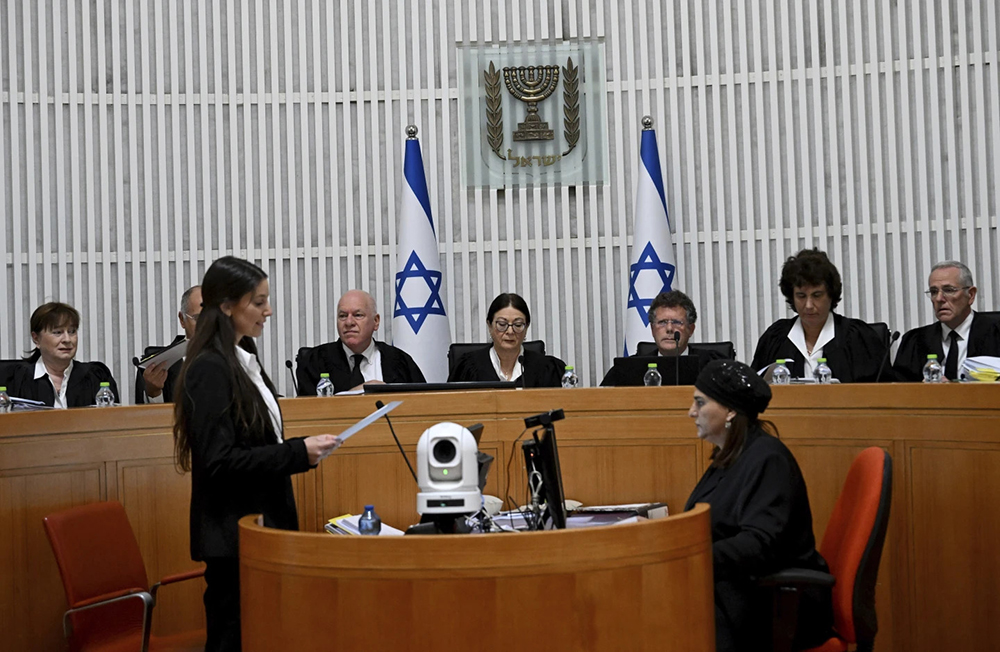|
Getting your Trinity Audio player ready...
|
Edited by: Fern Sidman
Israel’s Supreme Court heard the first challenge Tuesday to Prime Minister Benjamin Netanyahu’s judicial overhaul plan, deepening a showdown with the government over this matter that has bitterly divided the nation and put it on the brink of a constitutional crisis, as was reported by the Associated Press.
Netanyahu’s ruling coalition unveiled the judicial reform measures earlier this year, saying it was necessary to rein in an unelected judiciary they believe wields too much power, the AP report said.

Opponents of the judicial overhaul have claimed that the power of the Supreme Court in Israel would be weakened and that limiting the court’s jurisdiction would be considered a serious threat to Israeli democracy as they believe that it would concentrate power in the hands of Netanyahu and his allies.
They say the court is a key counterweight on majority rule in a country with an otherwise weak system of checks and balances — with just one house of parliament where the governing coalition is headed by the prime minister, according to the AP report. The country’s president has largely ceremonial powers, and there is no firm, written constitution.
The case that opened Tuesday focuses on the first law passed by parliament in July — a measure that cancels the court’s ability to strike down government moves it deems to be “unreasonable,” as was reported by the AP. Judges have used the legal standard in rare cases to prevent government decisions or appointments viewed as unsound or corrupt.
The hearing puts Israel’s Supreme Court in the unprecedented position of deciding whether to accept limits on its own powers, which hitherto had been unheard of, the report added. In a sign of the case’s significance, all 15 justices are hearing the appeal together for the first time in the country’s history, rather than the typical smaller panels, according to the AP report. The proceedings were also livestreamed and aired on the country’s main TV stations.
A ruling is not expected for weeks or even months, but the session Tuesday could hint at the court’s direction, the AP reported. The marathon hearing was largely businesslike, though at times the arguments became tense and heated.
In one exchange, Simcha Rothman, a senior government lawmaker who has shepherded the overhaul through parliament, insisted the court could not be trusted to decide its own fate.
“Can you be the ones to judge this without fear, without prejudice, without bias? Because you are dealing with your own honor and status,” Rothman told Esther Hayut, the chief justice of Israel’s Supreme Court. “And you talk about the Knesset’s conflict of interest?”
The AP report indicated that Hayut chided him, responding that the court does not deal with its own status but rather “the essential interests of the public.”
In another exchange, Justice Isaac Amit challenged a lawyer representing Netanyahu’s coalition who said the new law doesn’t endanger democracy. “Democracy doesn’t die from few strong blows. Democracy dies in series of small steps,” said Amit, who is expected to succeed Hayut as chief justice after she retires later this year, the AP reported. The protocol at the Supreme Court in Israel allows for justices to choose their own replacements when they retire or if they should decide to leave their positions on the court for their own reasons.

His comment elicited an outburst from a back row by Tally Gotliv, a lawmaker with Netanyahu’s Likud Party, who shouted: “The Knesset sanctifies democracy.” The AP reported that Hayut swiftly reprimanded her.
Netanyahu has not said whether he would respect a decision by the court to strike down the new law. Some members of his coalition have hinted that the government could ignore the court’s decision, the AP reported.
Israel National News reported that following the first day of hearings on the petitions to strike down the Basic Law, the Likud party sent a message to the justices of the Supreme Court.
“The most important element in a democracy is that the people are the sovereign,” the party stated, as was reported by INN. “The Knesset receives its authority from the people. The government receives its authority from the Knesset. The court receives its authority from the Basic Laws that the Knesset enacts.”
The Likud party added that, “If the court can cancel Basic Laws, it turns itself into a sovereign instead of the people. This extreme step will undermine the foundation of democracy. This is a red line that must not be crossed.”
The Yesh Atid party said in response to the Likud’s statement: “The most important element in democracy is that the people are sovereign. Not the government. The sovereignty of the people is protected thanks to the separation of powers, checks and balances, and the protection of the court against the tyranny of the government. The Knesset does not have unlimited authority. It cannot legislate everything that comes to its mind. It cannot pass a law that cancels the elections for the next ten years,” as was reported by Israel National News.
“It cannot enact a law according to which those who did not serve in the army cannot vote. 61 MKs who won the elections cannot vote in three readings for the imprisonment of the 59 MKs who lost,” the left-wing, secular party added.
“The Likud announcement is worrying and dangerous because it proves once again that the Israeli ruling party has lost its commitment to the democratic values on which the State of Israel is founded,” the Yesh Atid statement concluded, as was reported by INN.
Also on Tuesday, INN reported that Supreme Court President Esther Hayut stated that there needs to be a “mortal blow” to Israeli democracy in order to justify the striking down of a quasi-constitutional Basic Law during the first hearing on petitions to strike down such a law.
Addressing attorney Aner Helman, the representative of Attorney General Gali Baharav-Miara, Hayut said: “We can’t nullify Basic Laws every other day. There needs to be a mortal blow to the basic tenets of the state as a democratic state,” INN reported.
The government has argued that the court would abrogate to itself supreme power if it takes the unprecedented step of striking down a Basic Law, overriding the will of the people and all democratic standards, the report added.
Opponents of the Reasonableness Standard law argue that the standard, which allows the court to strike down laws and government actions on the subjective standard that no “reasonable” government would act in such a manner, is a necessary check on the government’s authority and protects the rights of minorities. The attorney general has supported the petitions against the law.
INN also reported that Attorney Helman responded to Hayut that the Reasonableness Standard law constitutes “a major blow to the rule of law.”

Other justices also questioned Helman’s claims that the law harms Israel’s democracy. The INN report indicated that Justice David Mintz, who has previously written that the court does not have the authority to strike down Basic Laws, said: “By referring to the Declaration of Independence you are creating something out of nothing, there is no implied authority [in Israel’s Declaration of Independence].”
Justice Noam Sohlberg questioned whether the passage of the law more than two months ago meant that “we are no longer living in a democracy today.”
The AP reported that the plan to overhaul the judiciary has infuriated people across many segments of Israeli society. Hundreds of thousands poured into the streets in repeated mass protests for the past 36 weeks, expressing their staunch opposition to such measures being implemented.
On Monday evening, tens of thousands of anti-government protesters rallying against the judicial overhaul flooded the streets near the court, waving national flags and chanting for democracy, the AP report added.
“We stand here today with millions of citizens to stop the government coup,” said Eliad Shraga, chairman of the Movement for Quality Government in Israel, one of the groups that asked the court to strike down the new law. “Together we will preserve Israeli democracy.”
“This government has already expressed a desire to fire officials like the attorney general and replace them with yes-men that will do whatever the government wants. And the reasonability bill presumably takes away our power to challenge that,” said Noa Sattath, executive director of the Association for Civil Rights in Israel, a group challenging the law, the AP reported.
Detractors of the plan to reform Israel’s judiciary largely come from the country’s secular middle class, many of whom hold left-wing perspectives and are quite vocal in expressing their criticism of Netanyahu’s policies and leadership.
Those who support Netanyahu and his ruling Likud coalition are considered more “nationalistic” and oriented toward preserving Jewish religious values. Many reside in Israel’s biblical heartland, also known as Judea and Samaria. Some members of Netanyahu’s coalition represent this growing demographic and understand the power they will wield in future elections due to the fact that their numbers are increasing by leaps and bounds over their secular counterparts.
A source familiar with a religious faction in the Netanyahu coalition said that the polarization that is taking place in Israel over this issue is in actuality a smokescreen for the “real” issue that has been and continues to plague Israeli society.
Speaking on the condition of anonymity, the source told the Jewish Voice that, “The matter of judicial reform terrifies the secular left wing Israelis not because they are concerned about democracy. They comprehend the fact that demographics are not in their favor. They know that the religious and nationalistic camps are reproducing at enormous rates and they know that they will no longer be the majority in Israel in the decades to come and as such are worried about being “taken over” by the religious. Because many have a seething hatred towards the religion of their antecedents that they have divorced themselves from, they have launched a war against religious Jews.”
The source added, “That is what this campaign of incessant demonstrations are all about. This is the left wing’s watershed moment. This is the moment that they had been waiting in order to stage attacka against the growing power of the religious Jewish population in Israel. To them, Netanyahu is the right wing leader of the religious Jews and they will do anything to curtail his influence.”
The AP reported that opponents say that if the court’s power to review and overturn some government decisions is removed, Netanyahu’s government could appoint convicted cronies to Cabinet posts, roll back rights for women and minorities, and annex Judea and Samaria.
Many of the secular opponents of the judicial reform plan that leading players in Israel’s high tech industry that has proven quite lucrative for the country as well as dominating headlines around the world for the stellar advancements they have made in such fields as medicine, science, and business, among others. These high tech titans and their acolytes have threatened to leave Israel and take their wealth with them, while reservists in the Israel Defense Forces have put the country on notice that they will not serve in the army, in the hopes of blackmailing the ruling parties in the government.
Their opprobrium felt for Netanyahu and all that he represents has been visible for quite some time and on Tuesday the AP reported that thousands of Israeli academics and artists have urged President Joe Biden and U.N. Secretary-General António Guterres to shun Netanyahu during his visit to the United States next week, underlining the divide between Israel’s far-right government and segments of the country’s population.
The AP also reported that in an open letter published Wednesday, over 3,500 signers, including well-known Israeli writer David Grossman and painter Tamar Getter, called on Biden and Guterres not to meet with Netanyahu or invite him to speak at the U.N. General Assembly’s yearly meeting of world leaders.
The prime minister’s office has said Netanyahu will travel to the U.S. next week to visit high-tech leaders in California before flying to New York to address the U.N.
“Netanyahu incites citizens against each other, threatens the country’s security and economy, and turns his face away from the historical conflict that tears Israel apart – the forceful domination of the Palestinian people,” the open letter read, as was reported by the AP.
In an op-ed piece that appeared on Tuesday, Abi Abelow, writing for Israel National News stated, “only the pro-judicial reform movement leaders want Israel to be Jewish state with a democratic governance system. The leadership of the anti-democracy/anti-judicial reform protest movement want Israel to be a democracy, like the US, France, Britain etc., without being a Jewish state. The current Supreme Court majority shares that ethos.”
He added, “That is why they support the justice system in nullifying all laws that deport illegal migrants. That is why they support the justice system harming equal opportunity for religious women by banning separate studies and performances for women in the name of “equality”. And that is why they support the justice system eventually changing Israel’s national anthem and getting rid of the right of Jews to return to Israel and receive automatic citizenship. That is what the protest movement is truly about, and most of the protestors have no clue how they are being used by an anti-Israel protest movement.”
He concluded by writing, “The leaders of the anti-democracy/anti-judicial-reform protest movement are not fighting for ‘justice’, or for ‘democracy’. It is about whether Israel remains a Jewish state or ceases to be one.”




